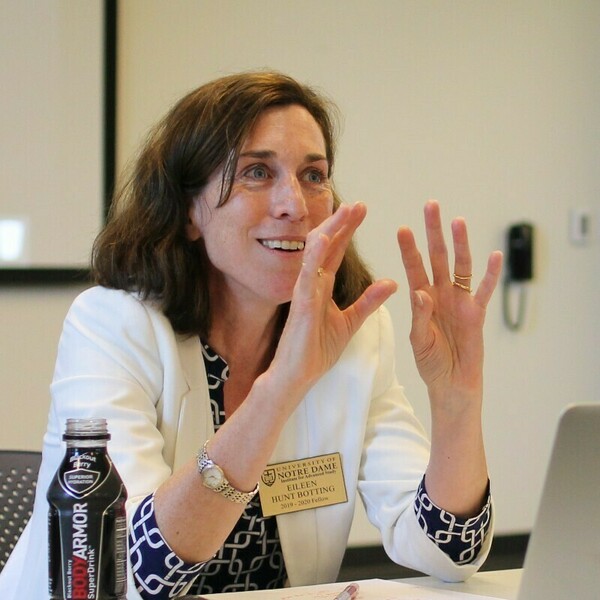
Dr. Eileen Hunt, professor of political science and a fellow with the Nanovic Institute for European Studies, is teaching a class this summer titled “AI Before and After Frankenstein.” The course featured a lecture series of distinguished AI scholars, which was sponsored by the CCCG.
Professor Hunt first had the idea for the course after writing an essay on Mary Shelley’s Frankenstein for Aeon Magazine in 2018. She said “many readers asked [her] to write more on the ethical implications of Shelley's novel for contemporary conceptions and applications of AI.”
The course explores Mary Shelley’s 1818 novel, Frankenstein, as one of the founding texts of modern political science fiction and the source of many modern ideas of artificial intelligence. It also includes a 10-speaker series sponsored by the CCCG. The class description details, “by tracing a modern history of ideas and images of AI, we can see how Frankenstein’s Creature became a prototype for humanoid automata and surveillance machines with the power to either help or hurt humanity.”
Collette Doyle, rising Junior studying Political Science and Theology, signed up for the course because she was “intrigued by the idea of connecting classic political theory texts to modern AI” especially with “the rise of chatbots — a type of AI — like ChatGPT over the past year or so, I figured a course like this would be pretty timely in my college career.”
Speakers lined up for the course include Professor Lauren Goodlad, editor of new journal Critical AI, Pastor Joshua Smith, Ph.D., author of Robot Theology, Professor Doreen Herzfeld, Professor of Theology at St. John's University, Professor David Gunkel, author of Person, Thing, Robot and Robot Rights, Amy Frey, playwright and director of "Monster," a 2022 theatrical adaptation of Frankenstein, Professor Duncan Bell, Professor of Political Thought and International Studies at the University of Cambridge, just to name a few.
Both Doyle and classmate Maxwell Feldman said their favorite lecture was "Three Interpretations of the Image of God in Theology and AI” with Doreen Herzfeld because of her approach to the question of AI through a theological lens. Feldman said the lecture “provided a comprehensive framework of what AI is (and possibly can be), what is both human and non-human-like about it, and how we can approach AI from a Catholic position.”
Doyle thoroughly enjoyed learning about Herzfeld’s research, which questions the humanity of AI. “Essentially,” Doyle asks, “if AI is created in our image, just as we are created in God’s, are those images bound to be the same? Is there a similar relationship between creator and the created? … It was really fascinating to hear how [Herzfeld] researched different approaches to understanding the image of God — reason, function and relationship — in order to extrapolate the image of human beings in connection to AI.”
“It was quite poignant to hear her, as a woman computer scientist, argue that the spiritual value of humanity’s relationship to nature and God’s whole creation is something that our cultural and philosophical engagement of AI ought to reawaken,” Professor Hunt said of Herzfeld’s talk.
Engaging in conversations about the implications of AI within political theory and our political framework are extremely important, especially in encouraging “interdisciplinary thinking and foster[ing] a deeper understanding of the ethical and political implications of AI,” Feldman says. “As AI continues to advance rapidly, it is vital to engage in meaningful discussions about its impact on society, individual rights, and our shared future. By exploring the historical roots and philosophical underpinnings of AI, we can navigate its ethical challenges and shape its development in a responsible and human-centered manner.”
Feldman says he “now see[s] [readings of Hobbes, Locke, and Milton’s] works as foreshadowing the complex questions surrounding autonomy, control, and the consequences of creating intelligent machines” through the texts he has read in the course.
“Students [are] often referring back to the ideas of Professor David Gunkel on the person-thing dichotomy in Western law dating to the ancient Romans and how the concept of the robot explodes that binary opposition: as in, we can't definitively say that a robot is a thing or a person, but it occupies a nebulous third category that offers up the opportunity to rethink our relationship to the creations/creatures we make with our technologies,” Hunt says.
Professor Hunt articulated the difference she already sees in the way her students are thinking about AI: “As a professor, I feel confident that the students in ‘AI before & after Frankenstein’ are learning about ideas and debates that will shape not only their thinking, but the world's thinking, for centuries to come. … I can already see how their world views have changed on AI and I look forward to seeing how they use their knowledge of AI ethics in their careers beyond Notre Dame.”
Professor Hunt hopes to teach the course again next year, “especially if I can run another virtual speaker series on AI ethics care of the generous support of the CCCG! The speaker series really made the online experience special for the students. We were able to bring in the leading scholars in AI ethics to speak directly to them. As a result, the students know the cutting-edge debates in the field.”
Below are links to the guest lecture videos:
Victorian 'Artificial Intelligence: An Ongoing History
Professor Lauren Goodlad
Milton, Genesis, and AI ethics
Pastor Joshua Smith, Ph.D.
The Artifice of Intelligence: Human and Divine Relationship in a Robotic World
Professor Noreen Herzfeld
Person, Thing, Robot & Robinson Crusoe
Professor David Gunkel
Bentham's Panopticon and Surveillance Machines
Dr. Kristen Collins
AI Hype from the Mechanical Turk to Frankenstein's Creature to Chat GPT
Professor Luke Fernandez
Technological/Artistic Adaptations of the Frankenstein Story
Professor Noah Giansiracusa and Amy Frey
Blade Runner, Neuromancer, and the Cyberpunk Aesthetic
Professor Duncan Bell
The Wartime Origins of Orwell's 1984 and Contemporary Debates on Surveillance Tech
Professor David Armitage
Article contributed by CCCG Writing Fellow Merlot Fogarty.